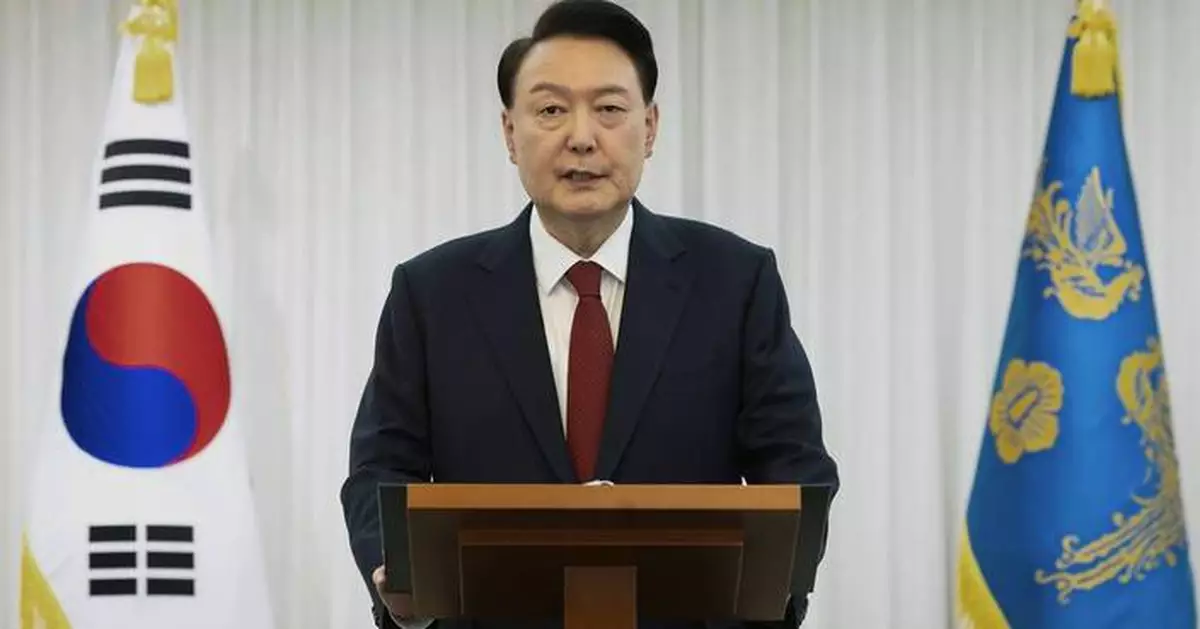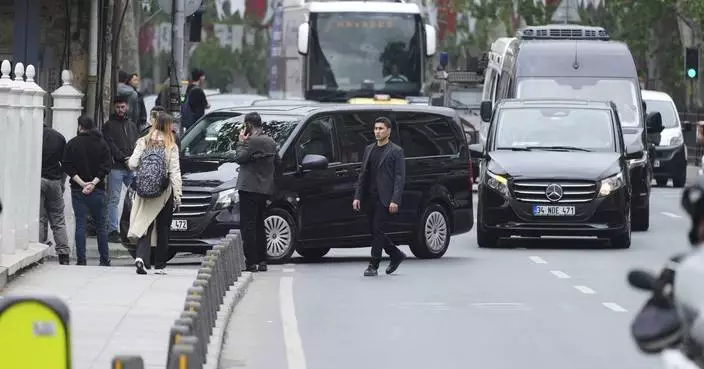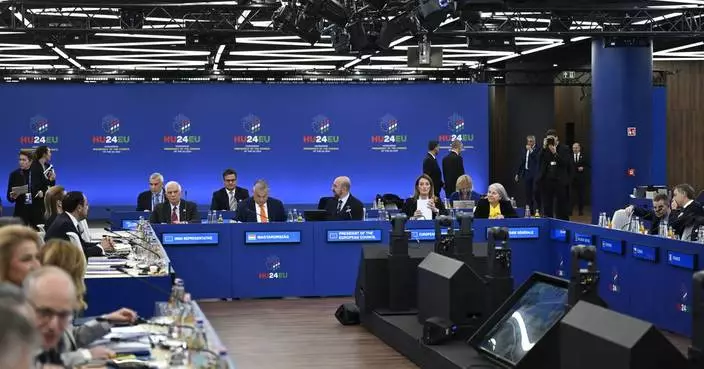SEOUL, South Korea (AP) — A South Korean court issued warrants Tuesday to detain impeached President Yoon Suk Yeol and search his office and residence over allegations of rebellion in connection with his short-lived declaration of martial law.
It's the first time a warrant has been issued to detain a sitting South Korean president. But experts say there is little chance of detention or searches unless Yoon is formally removed from office.
Click to Gallery
Supporters of impeached South Korean President Yoon Suk Yeol stage a rally near the presidential residence in Seoul, South Korea, Tuesday, Dec. 31, 2024. The letters read "Oppose Impeachment," and "Arrest Lee Jae-myung." (AP Photo/Lee Jin-man)
Supporters of impeached South Korean President Yoon Suk Yeol stage a rally near the presidential residence in Seoul, South Korea, Tuesday, Dec. 31, 2024. The letters read "Oppose Impeachment," and "Arrest Lee Jae-myung." (AP Photo/Lee Jin-man)
Supporters of impeached South Korean President Yoon Suk Yeol stage a rally near the presidential residence in Seoul, South Korea, Tuesday, Dec. 31, 2024. (AP Photo/Lee Jin-man)
Supporters of impeached South Korean President Yoon Suk Yeol stage a rally near the presidential residence in Seoul, South Korea, Tuesday, Dec. 31, 2024. The letters read "Oppose Impeachment," and "Arrest Lee Jae-myung." (AP Photo/Lee Jin-man)
Supporters of impeached South Korean President Yoon Suk Yeol stage a rally after hearing a news that a court issued warrants to detain Yoon, near the presidential residence in Seoul, South Korea, Tuesday, Dec. 31, 2024. The letters read "Oppose Impeachment." (AP Photo/Lee Jin-man)
Supporters of impeached South Korean President Yoon Suk Yeol stage a rally near the presidential residence in Seoul, South Korea, Tuesday, Dec. 31, 2024. (AP Photo/Lee Jin-man)
Supporters of impeached South Korean President Yoon Suk Yeol stage a rally after hearing a news that a court issued warrants to detain Yoon, near the presidential residence in Seoul, South Korea, Tuesday, Dec. 31, 2024. (AP Photo/Lee Jin-man)
FILE - Members of civic groups shout slogans during a news conference demanding the arrest of President Yoon Suk Yeol near the presidential residence in Seoul, South Korea, on Dec. 17, 2024. The letters read "Immediately arrest Yoon Suk Yeol." (AP Photo/Lee Jin-man, File)
FILE - In this photo released by South Korean President Office via Yonhap, South Korean President Yoon Suk Yeol speaks at the presidential residence in Seoul, South Korea, on Dec. 14, 2024. (South Korean Presidential Office/Yonhap via AP, File)
The Seoul Western District Court issued warrants to detain Yoon and to search the presidential office and residence in central Seoul, according to a statement from the Corruption Investigation Office for High-Ranking Officials, which is leading a joint investigation with police and military authorities.
The agency says it's been investigating whether Yoon's Dec. 3 declaration amounted to rebellion.
Under South Korean law, the leader of a rebellion can face the death penalty or life imprisonment if convicted. Yoon has presidential immunity from most criminal prosecutions, but the privilege does not extend to allegations of rebellion or treason.
Yoon's powers have been suspended since the opposition-controlled National Assembly voted to impeach him on Dec. 14 over his imposition of martial law, during which hundreds of troops and police officers were deployed at the assembly. By law, a president in South Korea is allowed to declare martial law only during wartime or similar emergencies and has no right to suspend parliament’s operations even under martial law.
Yoon has argued his decree was a legitimate act of governance, calling it a warning to the main liberal opposition Democratic Party — which he has called “a monster” and “anti-state forces” — that has used its legislative majority to impeach top officials, undermine the government’s budget, and which he claims sympathizes with North Korea.
The Constitutional Court is to determine whether to dismiss Yoon as president or reinstate him.
Experts said Yoon is likely to ignore the warrants. He's already dodged repeated requests by investigative authorities to appear for questioning, and the presidential security service has blocked attempts to search his office and residence citing a law that bans raids on sites with state secrets.
Yoon Kap-keun, a lawyer for the president, called the detainment warrant “invalid" and “illegal," saying the anti-corruption agency lacks legal authority to investigate rebellion charges. The presidential security service said it will provide security to Yoon in accordance with the law.
The anti-corruption agency said it has no immediate plans on when it would proceed with the warrants.
“Unless Yoon voluntarily lets them detain him, there is no way to detain him,” said Choi Jin, director of the Seoul-based Institute of Presidential Leadership. “Should investigators have hand-to-hand fights with the security service?”
Choi said that investigators were still likely to visit Yoon’s residence to show they are strictly and fairly carrying out their work.
Park Sung-min, president of Seoul-based political consulting firm MIN Consulting, said the push for an arrest warrant is likely an attempt to pressure Yoon to cooperate with investigations.
Former President Park Geun-hye, who was thrown out of office in 2017 following an impeachment over a corruption scandal, also refused to meet with prosecutors while in office. She underwent questioning by them and was arrested after the Constitutional Court removed her from office.
Yoon's imposition of martial law lasted only six hours but triggered huge political turmoil, halting high-level diplomacy and rattling financial markets. Despite Yoon's deployment of troops and police, enough lawmakers managed to enter the assembly chamber to overturn it unanimously.
Yoon's defense minister, police chief and several top military commanders have already been arrested over their roles in the martial law enactment.
Yoon has claimed he wasn't trying to stop the functioning of the assembly, saying that the troops were sent to maintain order, and also denied planning to arrest politicians. But comments by now-arrested commanders of military units sent to the assembly have contradicted this claim.
Kwak Jong-keun, the commander of the Army Special Warfare Command, testified at the National Assembly that Yoon called on troops to “quickly knock down the door and drag out the lawmakers who are inside." Kwak said he did not carry out Yoon’s orders.
The country's political crisis deepened last Friday, when the Democratic Party and other small opposition parties voted to impeach acting President Han Duck-soo as well over wrangling over his refusal to fill in three justice seats at the nine-member Constitutional Court. Observers say adding more justices could increase prospects for the court's endorsement of Yoon's impeachment as that requires support from at least six justices.
The deputy prime minister and finance minister, Choi Sang-mok, has become South Korea’s new interim leader. On Tuesday, Choi appointed two new justices, saying he feels the urgency to resolve political uncertainty and national divide.
Choi's moves drew rebukes from both the ruling and opposition parties. The governing People Power Party accused him of surrendering to the opposition’s political offensive, while the main liberal opposition Democratic Party urged Choi to quickly appoint the remaining ninth justice.
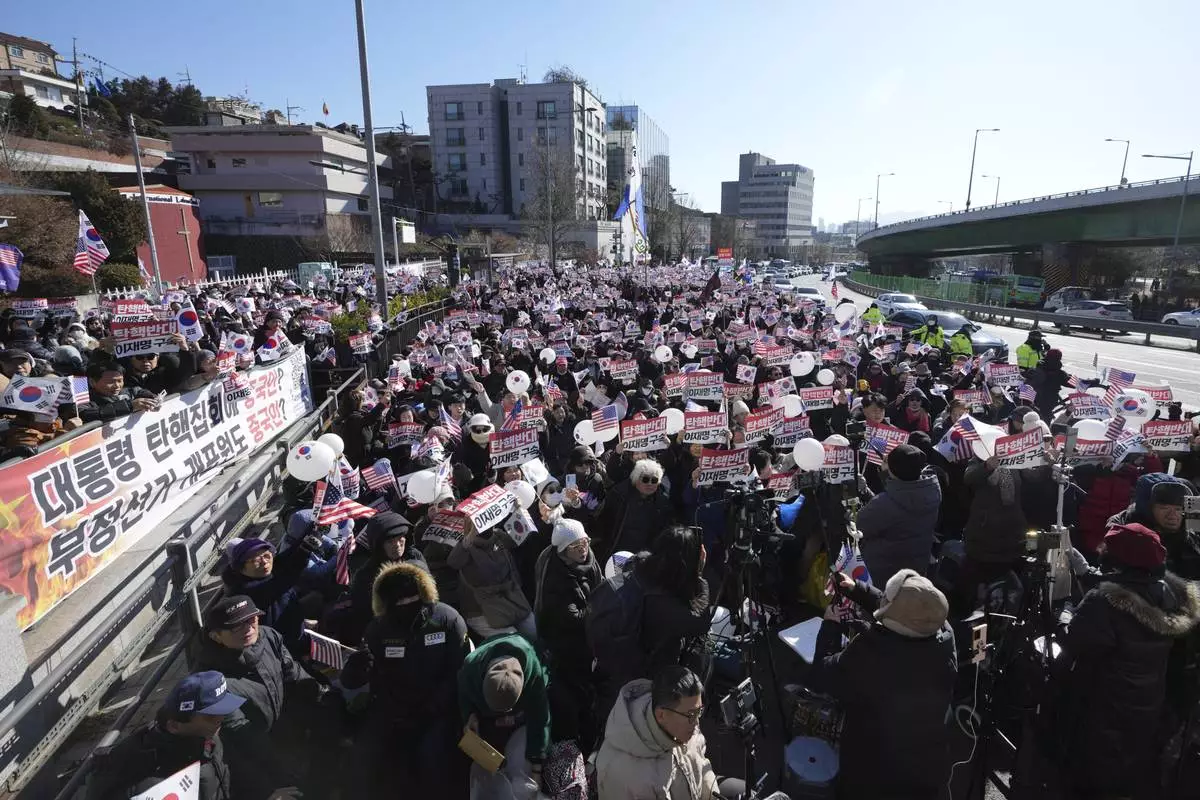
Supporters of impeached South Korean President Yoon Suk Yeol stage a rally near the presidential residence in Seoul, South Korea, Tuesday, Dec. 31, 2024. The letters read "Oppose Impeachment," and "Arrest Lee Jae-myung." (AP Photo/Lee Jin-man)
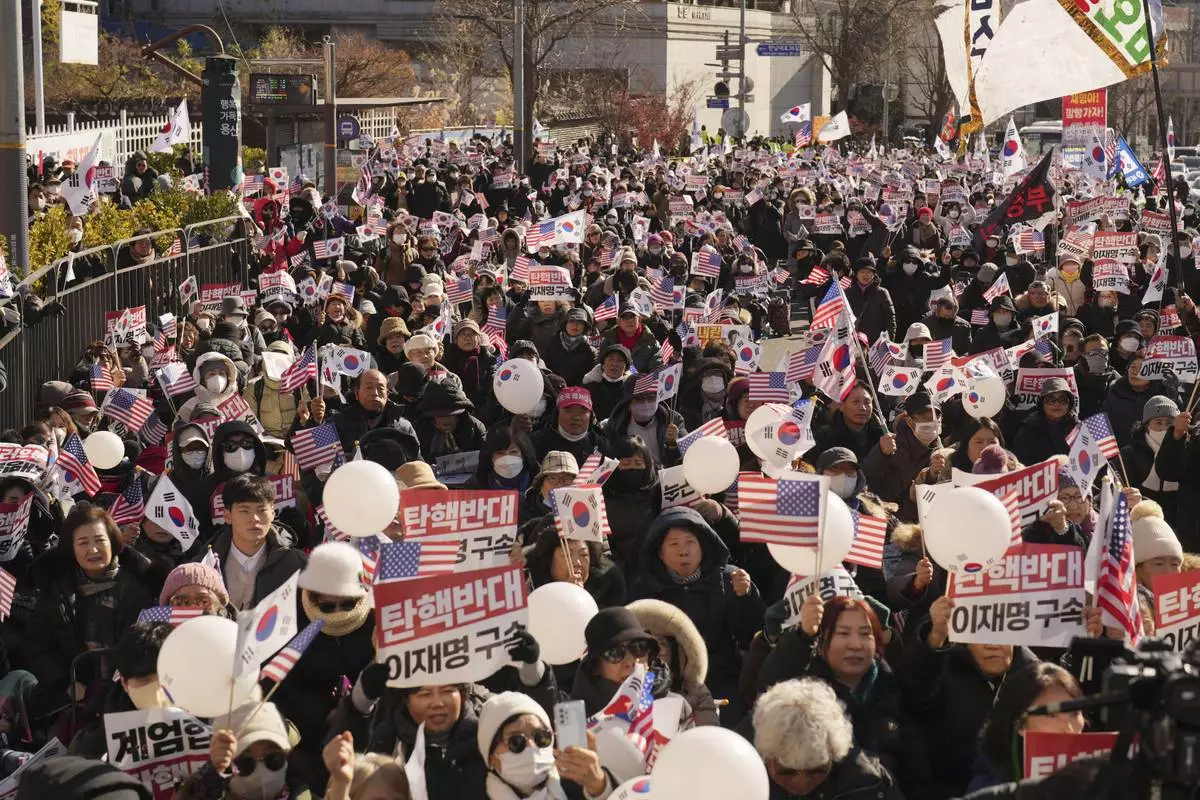
Supporters of impeached South Korean President Yoon Suk Yeol stage a rally near the presidential residence in Seoul, South Korea, Tuesday, Dec. 31, 2024. The letters read "Oppose Impeachment," and "Arrest Lee Jae-myung." (AP Photo/Lee Jin-man)
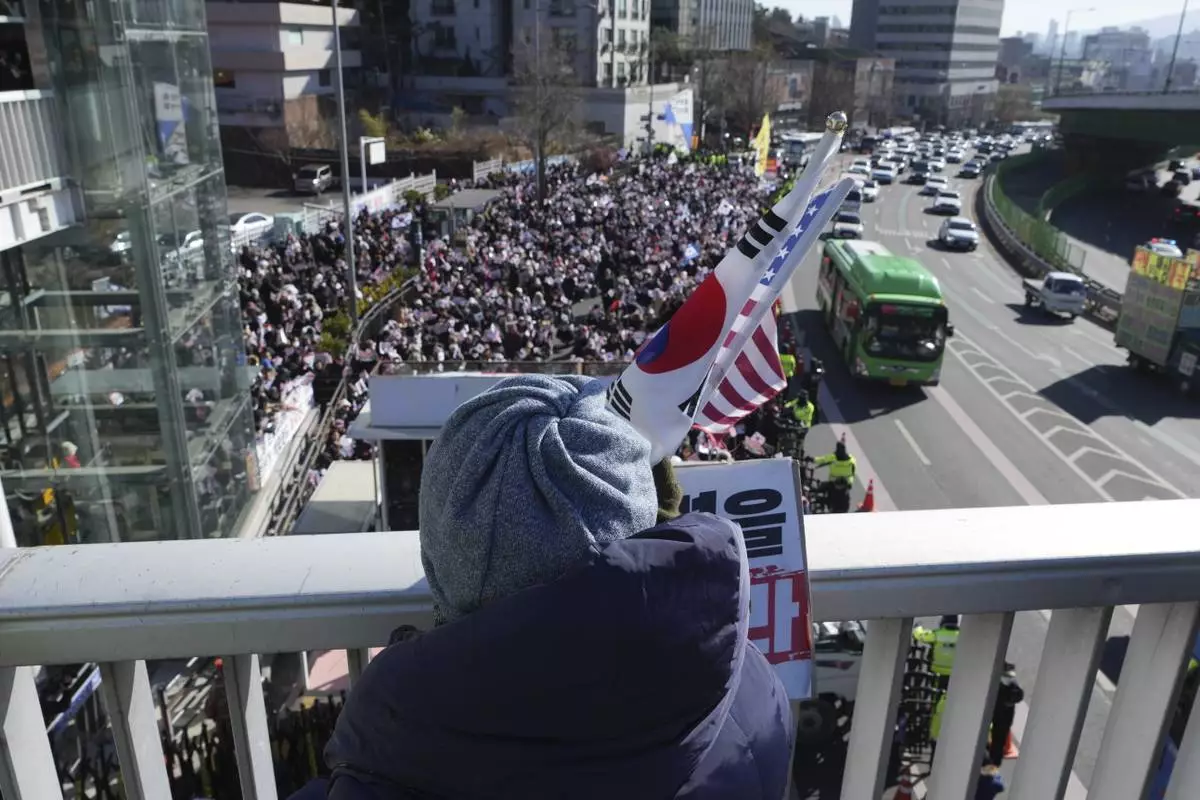
Supporters of impeached South Korean President Yoon Suk Yeol stage a rally near the presidential residence in Seoul, South Korea, Tuesday, Dec. 31, 2024. (AP Photo/Lee Jin-man)
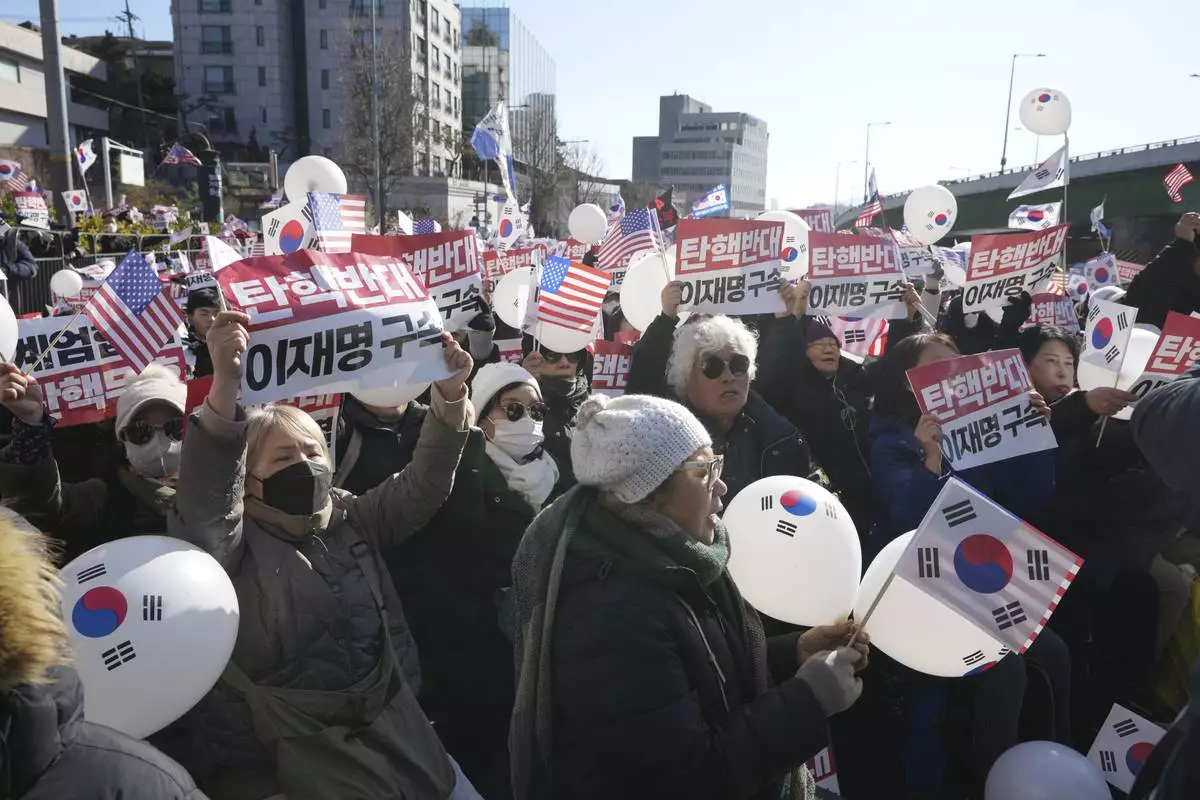
Supporters of impeached South Korean President Yoon Suk Yeol stage a rally near the presidential residence in Seoul, South Korea, Tuesday, Dec. 31, 2024. The letters read "Oppose Impeachment," and "Arrest Lee Jae-myung." (AP Photo/Lee Jin-man)
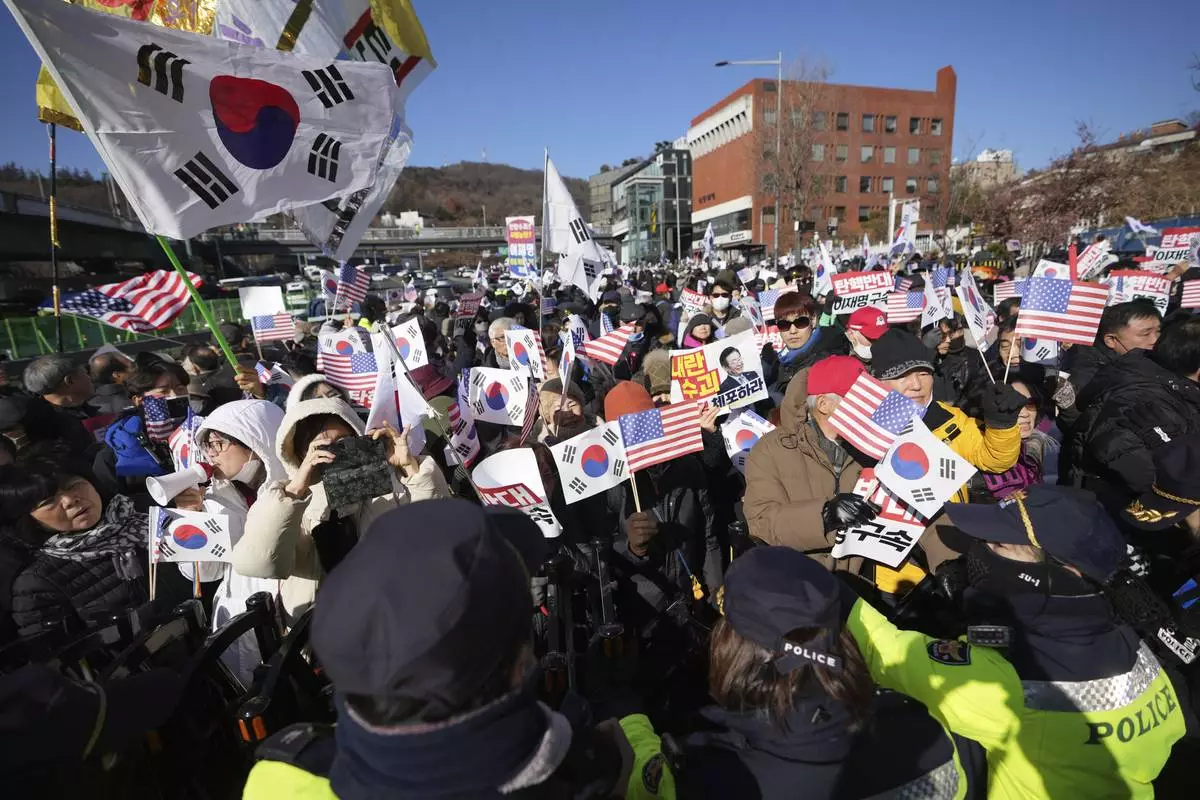
Supporters of impeached South Korean President Yoon Suk Yeol stage a rally after hearing a news that a court issued warrants to detain Yoon, near the presidential residence in Seoul, South Korea, Tuesday, Dec. 31, 2024. The letters read "Oppose Impeachment." (AP Photo/Lee Jin-man)
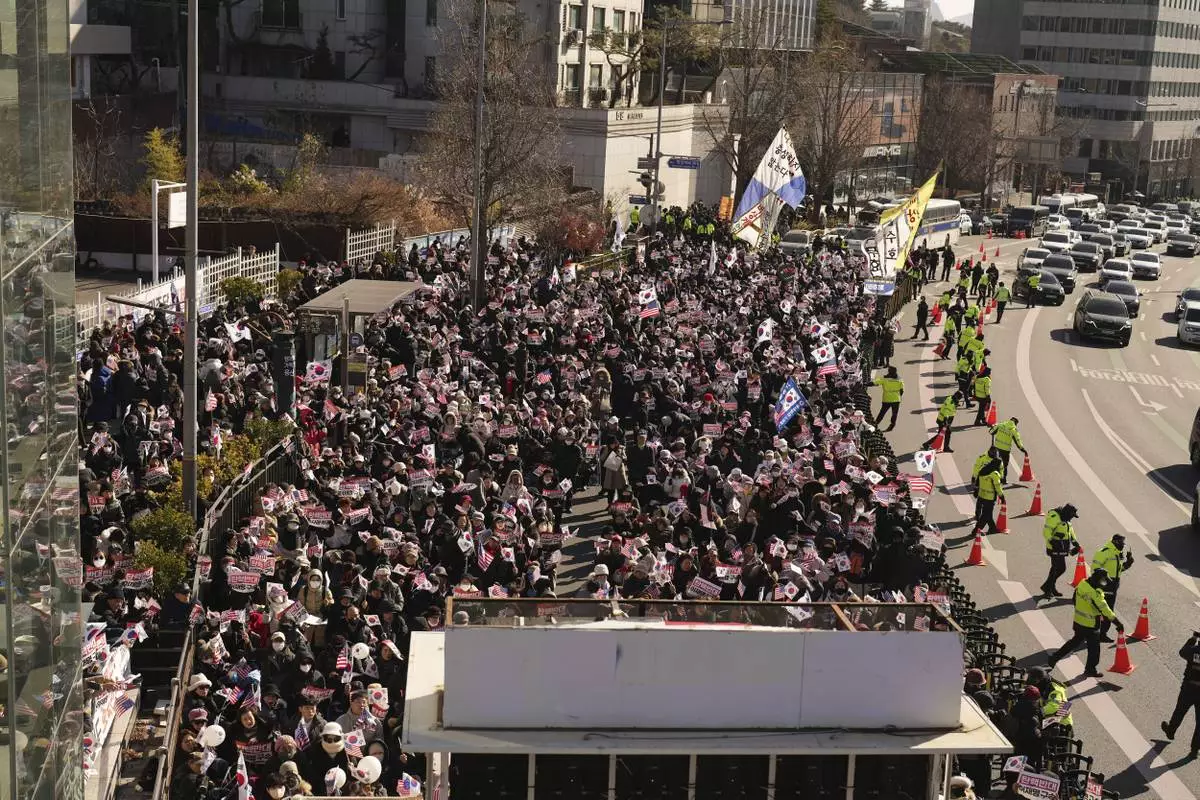
Supporters of impeached South Korean President Yoon Suk Yeol stage a rally near the presidential residence in Seoul, South Korea, Tuesday, Dec. 31, 2024. (AP Photo/Lee Jin-man)
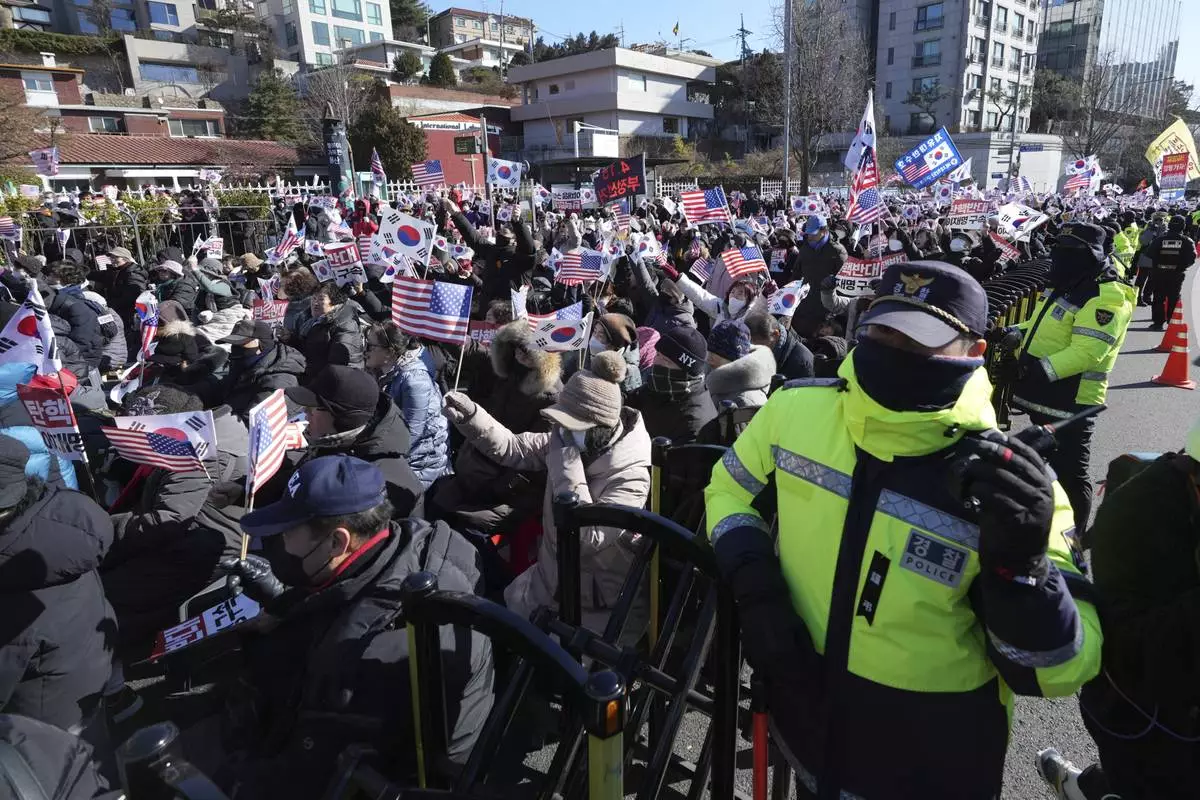
Supporters of impeached South Korean President Yoon Suk Yeol stage a rally after hearing a news that a court issued warrants to detain Yoon, near the presidential residence in Seoul, South Korea, Tuesday, Dec. 31, 2024. (AP Photo/Lee Jin-man)
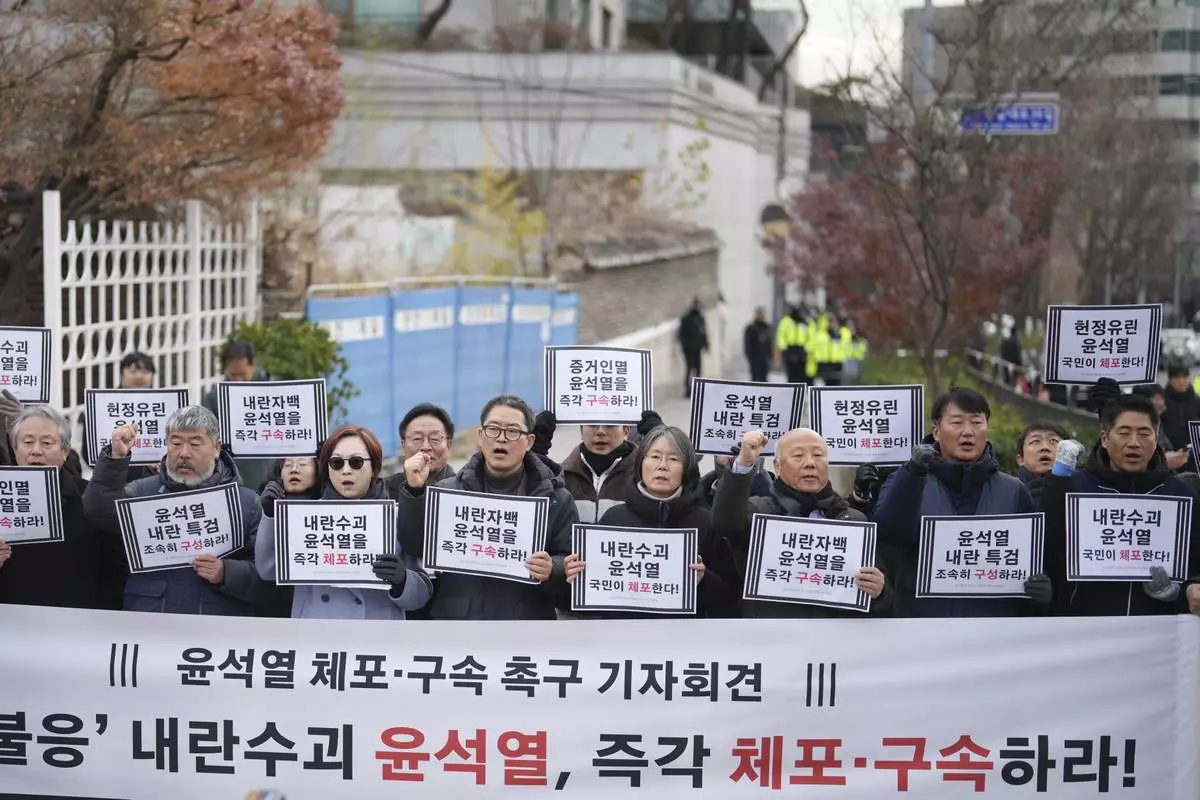
FILE - Members of civic groups shout slogans during a news conference demanding the arrest of President Yoon Suk Yeol near the presidential residence in Seoul, South Korea, on Dec. 17, 2024. The letters read "Immediately arrest Yoon Suk Yeol." (AP Photo/Lee Jin-man, File)
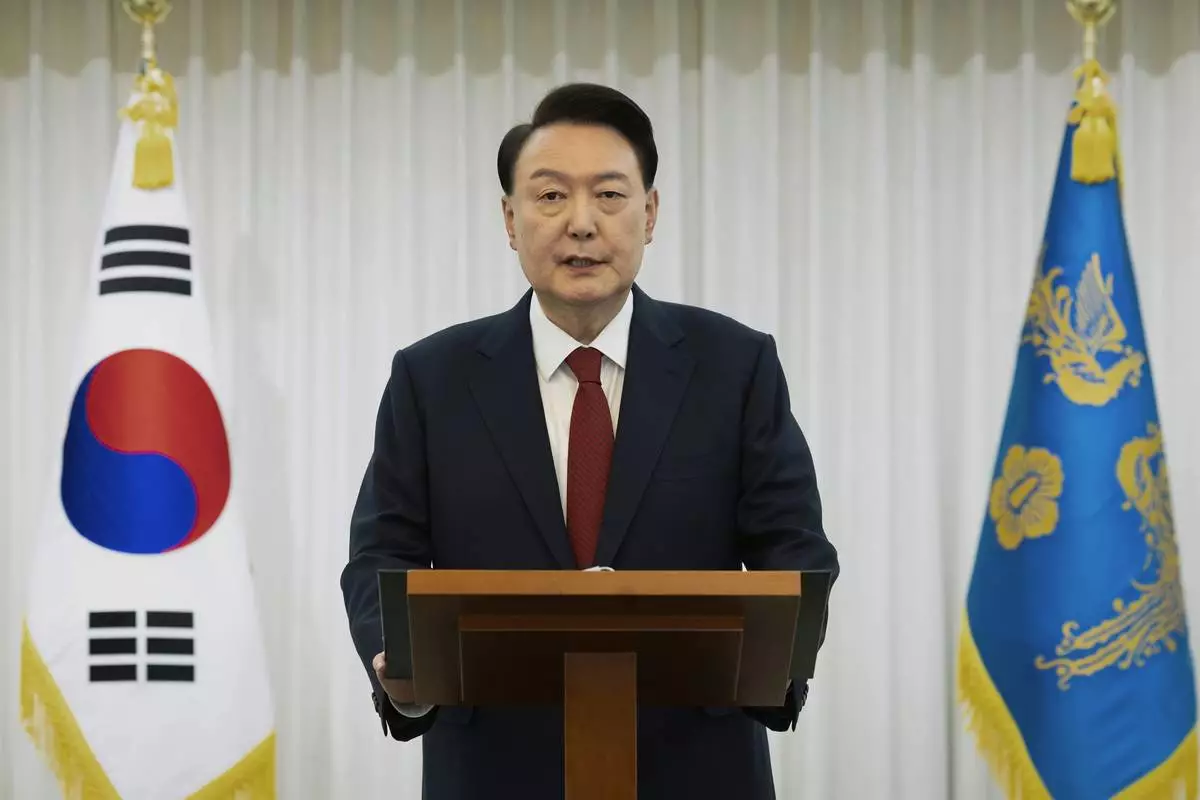
FILE - In this photo released by South Korean President Office via Yonhap, South Korean President Yoon Suk Yeol speaks at the presidential residence in Seoul, South Korea, on Dec. 14, 2024. (South Korean Presidential Office/Yonhap via AP, File)
ABU DHABI, United Arab Emirates (AP) — President Donald Trump used the first major foreign trip of his second term to outline a vision for restoring global stability that is grounded in pragmatism and self-interest rather than values, holding out U.S. ties to wealthy Gulf countries as a model for America’s longtime foes.
His four-day swing through Saudi Arabia, Qatar and the United Arab Emirates, which ends Friday, put a spotlight on Trump’s transactional approach to foreign affairs as he was feted by autocratic rulers with a trio of lavish state visits where there was heavy emphasis on economic and security partnerships.
His trip played out against the backdrop of stubborn global conflicts, including Gaza and Ukraine, that showed the limits of his influence. But Trump insisted he was turning the page on American “interventionalism” in the region as he moved to recognize the new government in Syria for the first time and prodded Iran to engage on nuclear talks before it’s too late.
Some takeaways from Trump’s travels:
Presidential trips to the Middle East usually feature at least some public calls for authoritarian governments to improve their human rights efforts. Not this one, as Trump celebrated his business deals with Gulf royals and admired their wealth.
Trump toured the marble and gilded palaces of Gulf rulers and deemed them “perfecto” and “very hard to buy.” He praised the “gleaming marvels” of the skyline in Saudi Arabia. And he groused about the “much less impressive” Air Force One.
In Trump’s remarks at a VIP business conference in Riyadh, he went out of his way to distance himself from the actions of past administrations, the days when he said American officials would fly in “in beautiful planes, giving you lectures on how to live and how to govern your own affairs.”
Rights advocates took that as a pledge of nonintervention, swearing off some of the pressure past U.S. presidents have brought to bear on partners to varying degrees to ease up on detentions, suppression of critics and other issues.
“It’s absolute support for absolute monarchy,” said Saudi exile Abdullah Alaoudh. His father, a Saudi cleric with a wide following there, is imprisoned in the kingdom.
Some rights advocates said Trump officials gave them private assurances the administration was working on behalf of detained Americans and rights advocates. Tommy Pigott, a deputy spokesman at the State Department, declined to say whether Trump raised those or other rights issues in discussions with Gulf royals.
While Trump was in the Mideast, Vladimir Putin opted to skip direct peace talks with Ukraine’s Volodymyr Zelenskyy despite the U.S. president's strong calls for them to meet face to face.
Trump has been pushing Putin and Zelenskyy to move with greater haste to end Russia's grinding war in Ukraine.
But after it became clear Putin wouldn’t be attending talks in Turkey this week and would instead be sending underlings to Istanbul, an annoyed Trump insisted he knew all along that it was highly likely Putin would be a no-show.
“I don’t believe anything’s going to happen whether you like it or not, until he and I get together,” Trump said. “But we’re going to have to get it solved because too many people are dying."
As he wrapped up his visit on Friday, Trump said the face-to-face would happen "as soon as we can set it up.”
Trump was scheduled to fly back to Washington on Friday, but tried to keep people guessing until the end. He teased late Thursday that he would be heading to a “destination unknown” — “probably" Washington, he added. His opaque language stoked speculation that he might make a drop-by to Turkey.
But on Friday morning, he told reporters he needed to get back to Washington. His daughter Tiffany had her first child while the president has been away.
“I would actually leave here and go,” Trump said. “I do want to see my beautiful grandson.”
Just two months ago, the Trump administration wasn’t sold on Syria’s interim government led by Ahmad al-Sharaa, the onetime al-Qaida-affiliated insurgent. They worried the Syrian president didn’t have the legitimacy to govern the country’s ethnically diverse population.
Clashes broke out in early March, killing hundreds and targeting many more members of the Alawite religious minority to which the ousted Syrian leader Basher Assad belongs.
The moment gave the Trump White House pause about easing sanctions on Syria. But Trump signaled Monday that he was having a change of heart and was moving toward lifting the Syria sanctions. A day later, he announced the move during an address to Gulf leaders.
Trump then took it another step by agreeing to meet al-Sharaa.
Trump said he was impressed with al-Sharaa, who not that long ago had a $10 million U.S. bounty on his head. The president called him a “young, attractive guy” with a "very strong past.”
Trump said it was recommendations from Turkish President Recep Tayyip Erdogan and Saudi Crown Prince Mohammed bin Salman that nudged him to take a chance on al-Sharra.
“President Erdogan called me and said: ‘Is there any way you could do that? Because if you don’t do that, they don’t have a chance,’” Trump said. “So, I did it.”
Throughout the trip, Trump felt more than comfortable dishing out exaggeration and hyperbole.
“This has been an amazing trip.” Trump told reporters Thursday as Air Force One was about to land in Qatar. “We’ve raised trillions of dollars of investment for our country.” A little later he put the figure at $4 trillion.
That figure is about two times the combined gross domestic products of Saudi Arabia, Qatar and the United Arab Emirates, meaning that any announced investments would likely accrue over several years — if at all — in ways that might not show up in overall U.S. economic growth numbers.
Boeing confirmed that Qatar’s $96 billion purchase of its 787 and 777X jets was the largest order for 787s and wide body jets in the company’s history. Trump enthused it was “the biggest order in the history of, I think, aviation, certainly of that size” of jets.
Trump also went overboard in running down the economic record of his predecessor, Democrat Joe Biden, at one point declaring, “The days of economic misery under the last administration are rapidly giving way to the greatest economy in the history of the world.”
The U.S. economy grew at 2.8% last year. It declined at an annualized rate of 0.3% during the first three months of this year.
While Trump's trip initially was conceived as a visit to reward countries that invest in the United States, Trump at one point hoped it also would herald significant steps to end the wars in Gaza and Ukraine. Positive news on both fronts proved elusive.
Trump barely mentioned either conflict on his trip – and when he did, it was generally in the context of his assertion that they wouldn’t have occurred had he won reelection in 2020.
As Israel stepped up an offensive in Gaza — a prelude to a promised full takeover of the territory if Hamas doesn’t release the remaining hostages in its captivity — Trump was again musing about the creation of a “freedom zone” in its territory. It's a notion rejected by Palestinians and the broader Arab world because Trump's plan would relocate civilians from Gaza to allow for rebuilding.
Israel conducted significant airstrikes all week in Gaza as Trump was in the region and the fighting on the ground appeared to escalate Friday morning even before Trump left the UAE.
Trump was already facing questions about conflicts of interest for traveling to the Middle East to shape U.S. policy at a time when his family’s business interests in the region have boomed. He attempted to quiet worries about national security and constitutional questions by insisting he’s smart to accept a $400 million luxury plane from Qatar and use it as Air Force One.
“Why should our military, and therefore our taxpayers, be forced to pay hundreds of millions of Dollars when they can get it for FREE,” Trump posted on his social media site during his Middle East swing.
The president also dodged questions about a state-backed investment company in Abu Dhabi using a Trump family-aligned stablecoin for a $2 billion investment in the world’s largest cryptocurrency exchange.
“I don’t know anything about it,” he said.
Beyond that, the Trump family has piled up deals to license its brand for real estate projects, and to build Trump towers and golf courses, around the Middle East. White House press secretary Karoline Leavitt says it’s “frankly ridiculous” to wonder if those profits might influence Trump’s governing decisions.
Madhani reported from Dubai. Associated Press writers Josh Boak, Will Weissert and Ellen Knickmeyer in Washington contributed to this report.
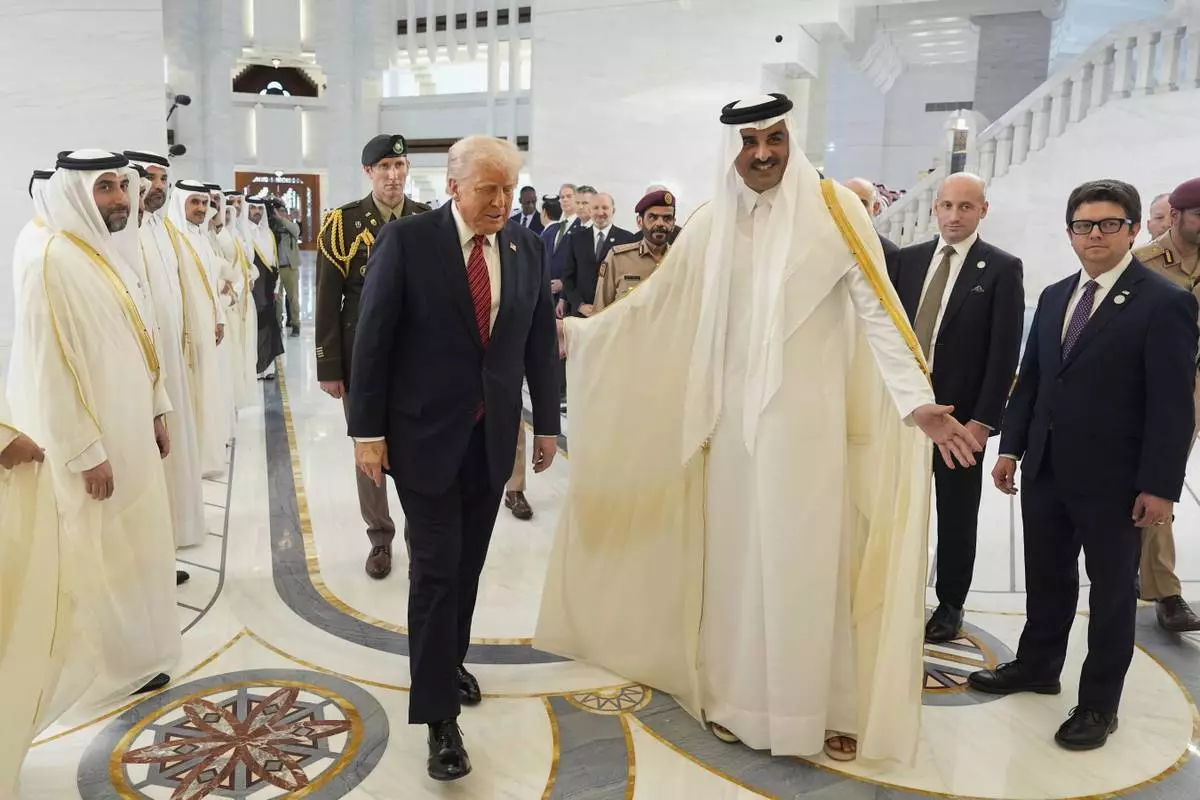
Qatar's Emir Sheikh Tamim bin Hamad Al Thani welcomes President Donald Trump during an official welcoming ceremony at the Amiri Diwan in Doha, Qatar, Wednesday, May 14, 2025. (AP Photo/Alex Brandon)
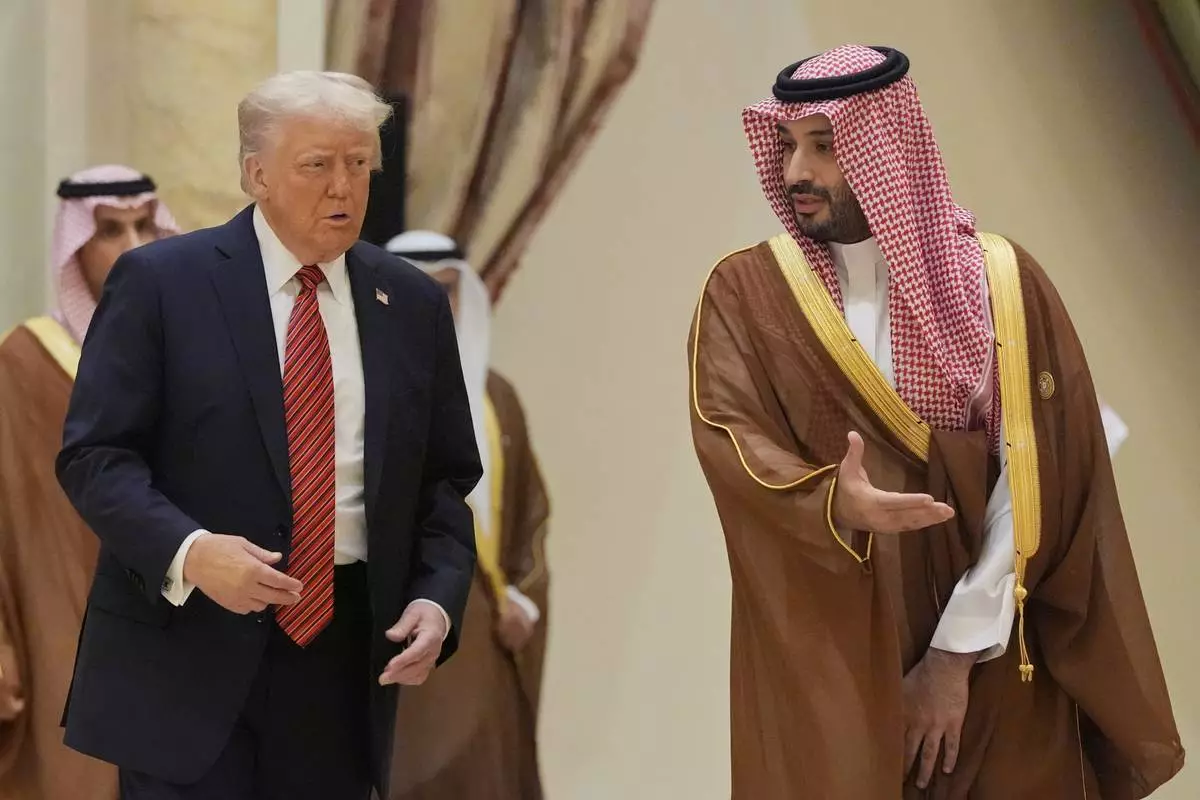
President Donald Trump arrives with Saudi Crown Prince Mohammed bin Salman for the group photo with Gulf Cooperation Council leaders during the GCC Summit in Riyadh, Saudi Arabia, Wednesday, May 14, 2025. (AP Photo/Alex Brandon)

President Donald Trump and UAE President Mohammed bin Zayed Al Nahyan arrive at Qasr Al Watan, Thursday, May 15, 2025, in Abu Dhabi, United Arab Emirates. (AP Photo/Alex Brandon)











